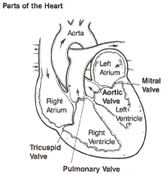CHOICE OF HEART VALVE
After determining the need for heart valve replacement, many factors are taken into consideration before choosing the valve best suited for your specific situation. These factors includes but not limited to the following:
- The patients age, sex, lifestyle and level of physical activities
- Whether the patient can tolerate daily anticoagulation for life, in the absence of known contraindications to anticoagulant therapy
- The presence of associated heart diseases such as chronic atrial fibrillation requiring long term anticoagulation therapy
- Women of child bearing age desiring future pregnancies and child birth
- Patients with End Stage Renal Disease on chronic hemodialysis
The choice of heart valve replacement includes:
- Mechanical valves
- Bioprosthetic (Tissue) valves
- Freestyle bioprosthesis Homografts
ANTICOAGULATION THERAPY FOLLOWING HEART VALVE REPLACEMENT OR REPAIR
These are general guidelines and may vary according to specific patient clinical condition.
- For proper valve fuction anticoagulation therapy may be required for some period of time after surgery.
- Indefinite anticoagulation therapy is required following heart valve replacement with mechanical valves
- Temporary anticoagulation therapy is usually required for about three months following heart valve replacement with tissue valves or homografts
- The anticoagulant keeps clots from forming on the valve, and keeps blood flowing properly through the valve.
- Regular blood Prothrombin blood test will be required to measure the amount of time it takes your blood to form a clot
- Watch for signs of bleeding or other reasons for concern ie excessive bleeding, dark brown or red urine/stools, pain or swelling, fever or infection Antibiotics prophylaxis required for dental and some surgical procedures to reduce risk of infection of the valve



